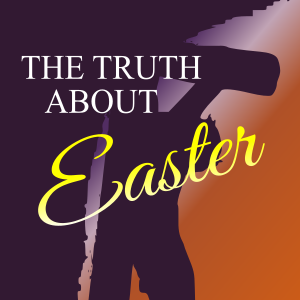Debunking the Myths About Easter

Author: Fitzroy Nembhard
Light shines brighter in the presence of darkness. Appreciation for what is genuine grows deeper when counterfeits are widespread. Consequently, as followers of Christ, we must seek to increase the intensity of our light and declare the truth of God even when the world rejects it. One area where taking a stand for truth is critical is in the celebration of Christian festivals and rites. We must not allow naysayers and false teachers to dampen our spirits or cause us to abandon our faith and the celebrations that help to unite us.
Is Easter a Pagan Celebration?

The celebration of Easter has been under attack for many years. Several memes appear on social media attempting to trace the origin of Easter to pagan goddesses or non-Christian deities. Memes are humorous artifacts (e.g., pictures, text, videos) that are spread widely online especially through social media. One commonly held and circulated belief is that the Christian celebration of Easter bears its origin on the writings of a scholarly monk named St. Bede. Bede proposed that the Anglo-Saxons, the ancestors of the English people, named the month of April after the pagan goddess Eostre (“Eastre”). Bede theorized that since the Easter festival fell in the month of the goddess, the people called the festival by the same name. However, scholars have not found any other mention of Eostre in ancient or medieval documents. Bede was making a guess. As people of truth, we must not base our beliefs on guesses but on solid time-tested facts.
Several other propositions have been made about the origin of Easter. These include Eostur, an old Norse word for spring as well as an old Germanic and Anglo-Saxon word for “east.” Believers must understand that many European languages derive their word for Easter from Pascha, the ancient Greek term for the festival used by the early Christians. The word Pascha in turn came from Pesach, the Hebrew word for Passover. This word is rendered as Easter in Acts 12:4. The Christian celebration of Easter commemorates the suffering of God’s only Begotten Son on the cross of Calvary to bridge the gap between God and humanity.
How Old is Easter?
Early Christians celebrated Easter, though they were not using the word Easter, as early as second century in Asia Minor. In Rome, the earliest celebration of Easter on the Sunday following the start of Passover took place around the year 165 A.D. This celebration occurred before the conversion of the Nordic and Anglo-Saxon people who were forcibly converted to Christianity by Charlemagne. Therefore, this Christian holiday could not have been derived from Anglo-Saxon goddesses. The correct understanding is that the Anglo-Saxons named months after things that occurred during those time periods. For example, Sol-mōnaþ (February, mud month due to heavy rains), Blōt-mōnaþ (November, blood month due to slaughter of livestock for winter), and Eoster-mōnaþ (April, budding of plants for spring). Interestingly, when Christianity was brought to Europe, the celebration of Pasca was done in the month Eoster-mōnaþ. The name Easter was derived from this understanding that April means the month of opening or budding (Eoster-mōnaþ). This bears no connection to a goddess Eostre or Ishtar. In the same way that truth and falsehood have always coexisted, pagan holidays have always existed alongside Christian festivals. This should not stop believers from celebrating biblically-based feasts.
What Should I do about Easter Memes?

With the growth of memes and the potential for misinformation to go viral, the people of God must continue to study to show themselves approved unto God (2 Tim 2:15). The desire for truth must surpass our desire for likes and followers. When faced with a meme or a pseudo-spiritual post, we can use the instructions that Paul gave to believers at Philippi (Philippians 4:8) as a guide. Is it true, just, pure, lovely, of good report, virtuous, and praiseworthy? Only then should we think on it, retweet it, share it or repost it. By following this time-tested admonition, we can keep religious festivals, including Easter, alive even in the presence of counterfeits and false teachers.